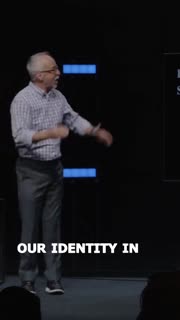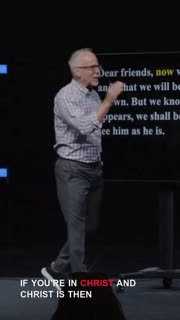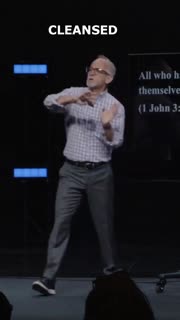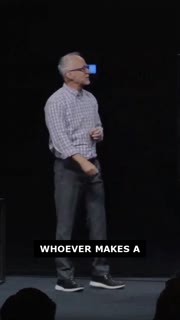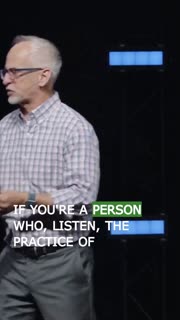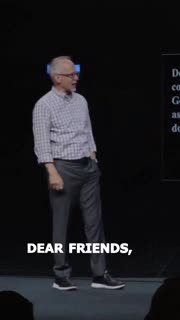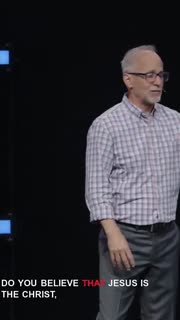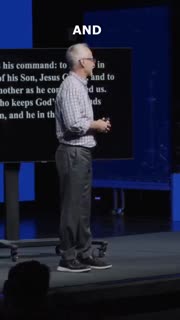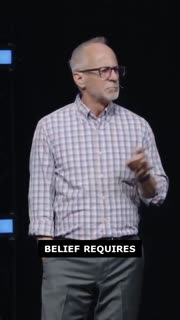Transforming Identity: Living as Children of God
Devotional
Sermon Summary
Bible Study Guide
Sermon Clips
1. "Our identity in Christ should impact our conduct in life. Not can. I usually use can because a lot of the imperatives in scripture, they're not as much musts as this is, okay? This is a must, all right? This is you, this must happen. Or you should wonder, are you still a child of the devil? Okay? That is so true." [31:15] (28 seconds)
2. "If you're in Christ and Christ is then in you, you are a child of God. You don't have to worry about whether or not the child of the devil part is not applying to you, okay? It won't, okay? Now it will become a litmus test for whether or not you're really a child of God, but if you're in, you're in. And you know that sitting here right now, you do." [36:14] (21 seconds)
3. "You have been cleansed of all your sins. Now we start participating. Purity and purification are the byproduct of a new identity. It doesn't, see where John puts this? Where that which is expected comes long after he talks about that which you need to experience. Because if he flipped them, all of a sudden the law group would be right." [42:18] (22 seconds)
4. "Whoever makes a practice of sinning, he's of the devil. This is not complicated, is it? If you're doing the complete opposite of that other verse, you're not saved. Like you don't get to this. I'm not deciding. Not me, Tim. And we're not telling you that to hurt you, but to help you. We want you to come to the recognition that you are not a child of God." [57:28] (31 seconds)
5. "If you're a person who, listen, the practice of your life is sinning, that's a serious problem because what you're doing is you're willfully deciding that the pattern of my life, the direction of my life, and the purpose of my life is up to me. And I'm going to decide, I'm going to exert my will, and I'm just going to do what I want to do and go where I want to go and think what I want to think and behave the way I want to think." [45:31] (26 seconds)
6. "You have got to make a decision for yourself. I can't be the fruit inspector. Your spouse can't be the fruit inspector. Because you know, sometimes the tree looks really, really good, but there's absolutely no fruit on it. No figs. Luke chapter 13, this little parable about, you know, the moment that Jesus had walked up, to a fig tree that had no figs, but it had all kinds of leaves and Jesus cursed it." [01:00:40] (30 seconds)
7. "Dear friends, if our hearts do not condemn us, we have confidence before God. So how do you get to this point? Confession. That's how you get rid of the self-condemnation. We have confidence before God and receive from him anything we ask because we keep his commands and do what pleases him, okay? And this is his command. Believe in the name of his son, Jesus Christ, love one another, and keep God's commands." [01:06:30] (31 seconds)
8. "Do you believe that Jesus is the Christ, that he is the Son of God? Do you believe, again, John 1 and 2, the full incarnational truths, that he was born of the Virgin Mary and he became man, that in him, all the fullness of deity, which means God, all the fullness of God. In fact, in Hebrews, it says, and it pleased God for all of his fullness to dwell in his Son. That's Hebrews chapter 1." [01:09:35] (30 seconds)
9. "And then he got up and put on his clothes and served them dinner. Didn't he? Here. He blessed the bread, broke the bread, and said, here, take this. All of you, eat it. This is my body, which is being given up for you. And after supper, again, he took the cup. Again, he gave thanks and said, take this, all of you, and drink it. Drink from it. Cup of my blood, the blood of a new and everlasting covenant being shed for you and for all men, so sins might be forgiven." [01:14:02] (29 seconds)
10. "Belief requires movement. It requires response, not mental assent, a response back to God. Are you ready to respond? Today, all I'd ask you to do is just raise a hand in this room anywhere, everywhere. Glasgow, Morgantown, respond. Respond. name that we pray to And all of God's people together said, amen. God bless you." [01:15:42] (60 seconds)
Ask a question about this sermon
2. "If you're in Christ and Christ is then in you, you are a child of God. You don't have to worry about whether or not the child of the devil part is not applying to you, okay? It won't, okay? Now it will become a litmus test for whether or not you're really a child of God, but if you're in, you're in. And you know that sitting here right now, you do." [36:14] (21 seconds)
3. "You have been cleansed of all your sins. Now we start participating. Purity and purification are the byproduct of a new identity. It doesn't, see where John puts this? Where that which is expected comes long after he talks about that which you need to experience. Because if he flipped them, all of a sudden the law group would be right." [42:18] (22 seconds)
4. "Whoever makes a practice of sinning, he's of the devil. This is not complicated, is it? If you're doing the complete opposite of that other verse, you're not saved. Like you don't get to this. I'm not deciding. Not me, Tim. And we're not telling you that to hurt you, but to help you. We want you to come to the recognition that you are not a child of God." [57:28] (31 seconds)
5. "If you're a person who, listen, the practice of your life is sinning, that's a serious problem because what you're doing is you're willfully deciding that the pattern of my life, the direction of my life, and the purpose of my life is up to me. And I'm going to decide, I'm going to exert my will, and I'm just going to do what I want to do and go where I want to go and think what I want to think and behave the way I want to think." [45:31] (26 seconds)
6. "You have got to make a decision for yourself. I can't be the fruit inspector. Your spouse can't be the fruit inspector. Because you know, sometimes the tree looks really, really good, but there's absolutely no fruit on it. No figs. Luke chapter 13, this little parable about, you know, the moment that Jesus had walked up, to a fig tree that had no figs, but it had all kinds of leaves and Jesus cursed it." [01:00:40] (30 seconds)
7. "Dear friends, if our hearts do not condemn us, we have confidence before God. So how do you get to this point? Confession. That's how you get rid of the self-condemnation. We have confidence before God and receive from him anything we ask because we keep his commands and do what pleases him, okay? And this is his command. Believe in the name of his son, Jesus Christ, love one another, and keep God's commands." [01:06:30] (31 seconds)
8. "Do you believe that Jesus is the Christ, that he is the Son of God? Do you believe, again, John 1 and 2, the full incarnational truths, that he was born of the Virgin Mary and he became man, that in him, all the fullness of deity, which means God, all the fullness of God. In fact, in Hebrews, it says, and it pleased God for all of his fullness to dwell in his Son. That's Hebrews chapter 1." [01:09:35] (30 seconds)
9. "And then he got up and put on his clothes and served them dinner. Didn't he? Here. He blessed the bread, broke the bread, and said, here, take this. All of you, eat it. This is my body, which is being given up for you. And after supper, again, he took the cup. Again, he gave thanks and said, take this, all of you, and drink it. Drink from it. Cup of my blood, the blood of a new and everlasting covenant being shed for you and for all men, so sins might be forgiven." [01:14:02] (29 seconds)
10. "Belief requires movement. It requires response, not mental assent, a response back to God. Are you ready to respond? Today, all I'd ask you to do is just raise a hand in this room anywhere, everywhere. Glasgow, Morgantown, respond. Respond. name that we pray to And all of God's people together said, amen. God bless you." [01:15:42] (60 seconds)
